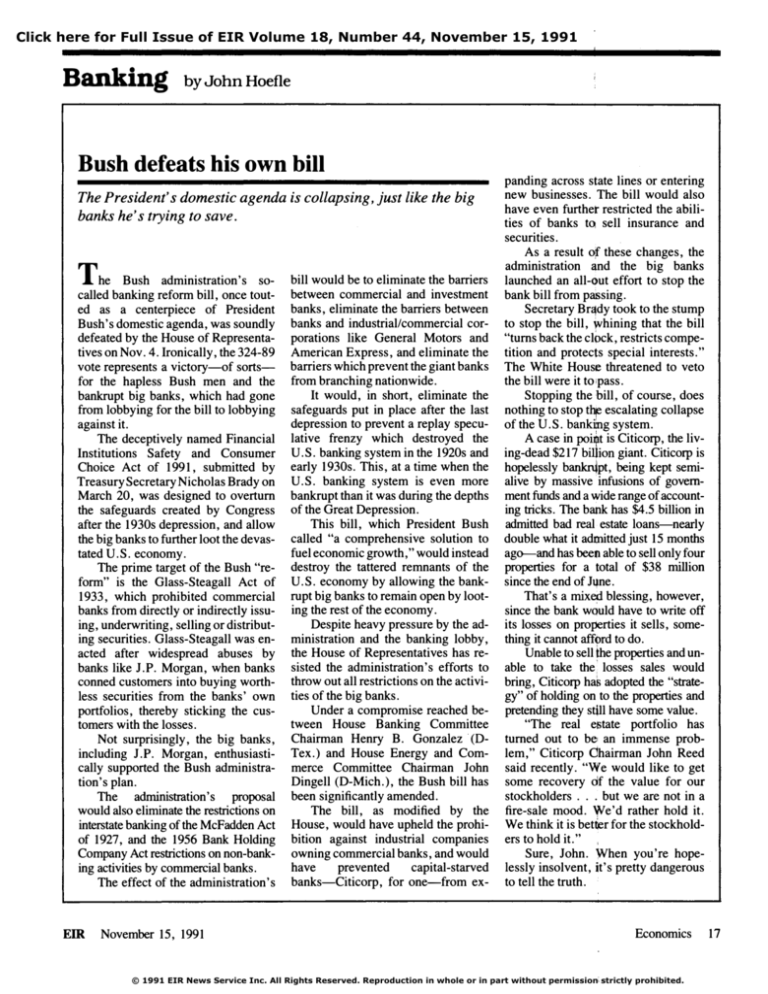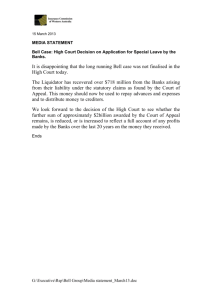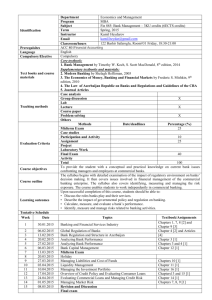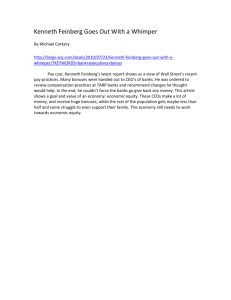
Click here for Full Issue of EIR Volume 18, Number 44, November 15, 1991
Banking
by John Hoefle
Bush defeats his
own
bill
The President's domestic agenda is collapsing, just like the big
banks he's trying to save.
T
he Bush administration's so­
called banking reform bill, once tout­
ed as a centerpiece of President
Bush's domestic agenda, was soundly
defeated by the House of Representa­
tives on Nov. 4. Ironically, the 324-89
vote represents a victory--of sorts­
for the hapless Bush men and the
bankrupt big banks, which had gone
from lobbying for the bill to lobbying
against it.
The deceptively named Financial
Institutions Safety and Consumer
Choice Act of 1991, submitted by
Treasury Secretary Nicholas Brady on
March 20, was designed to overturn
the safeguards created by Congress
after the 1930s depression, and allow
the big banks to further loot the devas­
tated U.S. economy.
The prime target of the Bush "re­
form" is the Glass-Steagall Act of
1933, which prohibited commercial
banks from directly or indirectly issu­
ing, underwriting, selling or distribut­
ing securities. Glass-Steagall was en­
acted after widespread abuses by
banks like J.P. Morgan, when banks
conned customers into buying worth­
less securities from the banks' own
portfolios, thereby sticking the cus­
tomers with the losses.
Not surprisingly, the big banks,
including J.P. Morgan, enthusiasti­
cally supported the Bush administra­
tion's plan.
The
administration's
proposal
would also eliminate the restrictions on
interstate banking of the McFadden Act
of 1927, and the 1956 Bank Holding
Company Act restrictions on non-bank­
ing activities by commercial banks.
The effect of the administration's
EIR
November 15, 1991
bill would be to eliminate the barriers
between commercial and investment
banks, eliminate the barriers between
banks and industrial/commercial cor­
porations like General Motors and
American Express, and eliminate the
barriers which prevent the giant banks
from branching nationwide.
It would, in short, eliminate the
safeguards put in place after the last
depression to prevent a replay specu­
lative frenzy which destroyed the
U.S. banking system in the 1920s and
early 1930s. This, at a time when the
U.S. banking system is even more
bankrupt than it was during the depths
of the Great Depression.
This bill, which President Bush
called "a comprehensive solution to
fuel economic growth," would instead
destroy the tattered remnants of the
U.S. economy by allowing the bank­
rupt big banks to remain open by loot­
ing the rest of the economy.
Despite heavy pressure by the ad­
ministration and the banking lobby,
the House of Representatives has re­
sisted the administration's efforts to
throw out all restrictions on the activi­
ties of the big banks.
Under a compromise reached be­
tween House Banking Committee
Chairman Henry B. Gonzalez· (D­
Tex.) and House Energy and Com­
merce Committee Chairman John
Dingell (D-Mich.), the Bush bill has
been significantly amended.
The bill, as modified by the
House, would have upheld the prohi­
bition against industrial companies
owning commercial banks, and would
have
prevented
capital-starved
banks--Citicorp, for one-from ex-
panding across state lines or entering
new businesses. The bill would also
have even further restricted the abili­
ties of banks tQ sell insurance and
securities.
As a result of these changes, the
administration �d the big banks
launched an all-out effort to stop the
bank bill from paSsing.
Secretary Br�dy took to the stump
to stop the bill, whining that the bill
"turns back the clock, restricts compe­
tition and protec�s special interests."
The White House threatened to veto
the bill were it tOipass.
Stopping the bill, of course, does
escalating collapse
nothing to stop
of the U.S. bankllDg system.
A case in po t is Citicorp, the liv­
ing-dead $217 bil1ion giant. Citicorp is
Pt, being kept semi­
hopelessly b
alive by massive infusions of govern­
ment funds and a wide range of account­
ing tricks. The bank has $4.5 billion in
admitted bad real estate loans-nearly
double what it admitted just 15 months
ago-and has bee� able to sell only four
properties for a total of $38 million
since the end of Jqne.
That's a mixep blessing, however,
since the bank WOuld have to write off
its losses on properties it sells, some­
thing it cannot aff�rd to do.
Unable to sell the properties and un­
able to take the losses sales would
bring, Citicorp hal; adopted the "strate­
gy" of holding on to the properties and
pretending they stU! have some value.
"The real e�tate portfolio has
turned out to be an immense prob­
lem," Citicorp dhairman John Reed
said recently. "We would like to get
some recovery Qf the value for our
stockholders . . . but we are not in a
fire-sale mood.
e'd rather hold it.
We think it is bet�r for the stockhold­
ers to hold it."
:
Sure, John. When you're hope­
lessly insolvent, it's pretty dangerous
to tell the truth.
�
ujl
anIcni
:
o/
Economics
© 1991 EIR News Service Inc. All Rights Reserved. Reproduction in whole or in part without permission strictly prohibited.
17








